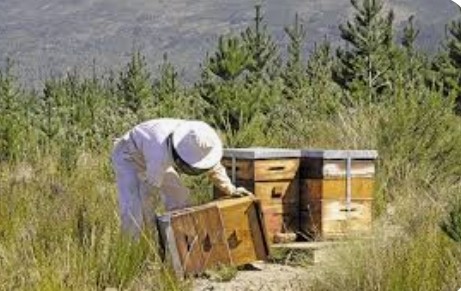By: Amb. Agim Godwin Apple

Apicultural development, also known as beekeeping, can indeed play a vital role in protecting against global warming and promoting a friendlier environment.
Bees are not only important for honey production but also for their crucial role in pollination, which directly supports healthy ecosystems and agricultural practices. Here are some ways in which sustainable apicultural development can contribute to a more sustainable and environmentally friendly world:

Enhancing pollination: Bees are essential pollinators for the reproduction of various plant species, including many food crops. By promoting healthy and sustainable beekeeping practices, we can ensure the availability of adequate pollinators, which in turn can enhance crop yields, biodiversity, and the overall health of ecosystems.
Conserving biodiversity: Bees are known as keystone species, meaning they have a disproportionately large impact on the environment compared to their abundance. By protecting and creating habitats that support bees and other pollinators, we can contribute to the conservation of biodiversity and promote the overall health of ecosystems.

Promoting sustainable agricultural practices: Sustainable beekeeping goes hand in hand with sustainable agriculture. By adopting practices that minimize the use of pesticides and prioritize the protection of pollinators, farmers can not only improve crop yields but also reduce their ecological footprint.
This approach promotes a more sustainable food production system and helps mitigate the adverse effects of global warming.
Carbon sequestration: Bees play a role in the pollination of trees and plants, which are crucial for carbon sequestration. As more trees and plants are pollinated and grow, they can absorb and store more carbon dioxide from the atmosphere, helping to mitigate global warming.
Education and awareness: Sustainable apicultural development can also play a significant role in raising awareness about the importance of bees and their impact on the environment. By educating communities about the benefits of bees, promoting responsible beekeeping practices, and supporting initiatives that protect bees and their habitats, we can create a society that values and actively works towards a friendlier environment.
It is important to note that sustainable apicultural development should prioritize the well-being of the bees themselves. Ensuring proper hive management, reducing stress factors, and minimizing the use of harmful chemicals are crucial aspects of sustainable beekeeping practices.

Overall, sustainable apicultural development can have a positive impact on global warming and the environment by enhancing pollination, conserving biodiversity, promoting sustainable agriculture, contributing to carbon sequestration, and raising awareness about the importance of bees.
By implementing and supporting such practices, we can cultivate a more sustainable and environmentally friendly world.
Copyright ©️ Agim Godwin Apple www.afdevco.org
